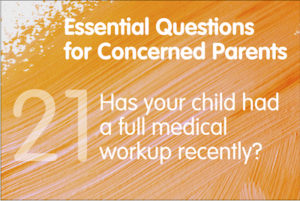 What if your child’s school difficulties have to do with poor eyesight or poor hearing? What if his or her lethargy, pain complaints, or sleeplessness are symptoms of a medical condition?
What if your child’s school difficulties have to do with poor eyesight or poor hearing? What if his or her lethargy, pain complaints, or sleeplessness are symptoms of a medical condition?
See if you can rule out genuine organic and biological causes for the “symptoms” that your child is displaying before supposing that they are “symptoms” of a “mental disorder.”
Unfortunately, the root causes of human behaviors are not so easily traced back to medical conditions even when such conditions exist. Equally unfortunately, the medical profession is under constant pressure from the pharmaceutical industry to shrink the normal range and increase the abnormal range of everything, paving the way for the prescription of chemicals. So, it may prove hard for doctors to accurately diagnosis a medical condition that actually exists and hard for them to restrain themselves from diagnosing conditions that do not truly exist.
Still, as possibly frustrating as the experience may prove, make sure that a medical workup is part of your plan to help your child with his or her current difficulties. And if that visit culminates in the doctor wanting to diagnose your child with a mental disorder, make sure to ask the following question: “In the absence of hard science that suggests that feelings, attitudes and behaviors are medical problems, why are you treating this like a medical problem?” See if the answer you get satisfies you—or if you get any answer at all. A medical workup is a necessity, in case a genuine medical condition is present. But be alert to the ways in which such a visit can lead to a spurious, non-medical mental disorder diagnosis.
*****
Read the Concerned Parents’ Project Introductory Post
To get in touch or to share your feedback, please email us
Read more on this topic
Interview: Why Parents Should Ask Questions
Visit Parent Resources for additional in-depth articles














